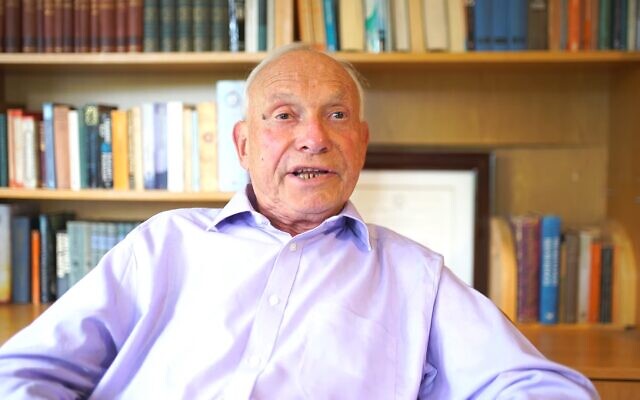‘European father of the internet’ who fled Nazis, Peter Kirstein, dies aged 86
Pioneer of modern technology and refugee from Berlin made history when he sent data from UCL to peers in the US in 1973
Tributes have been paid to a Jewish refugee turned computer scientist who gave The Queen an email account in 1976, after he died last month aged 86.
Peter Kirstein, whose family fled from Germany to London in the late 1930s, was nicknamed “the European father of the internet” after he sent a packet of data from University College London to peers in California in 1973, establishing the first connection of the Arpanet, the precursor to the internet.
Born in Berlin, he came to the UK with his father and sister in 1937 after his mother, who already had British citizenship, left Germany to set up a dental practice a year earlier. His father Walter quickly changed their surname from Kirschstein to Kirstein.
Peter studied at Highgate School, then Cambridge, before spending years studying, networking and earning a living in the US, including at the University of California.
He returned to Europe to work as a nuclear physicist at CERN, but his interest lay in computer communications and he returned to academia in London in the late 60s.
In 1973 he transmitted packets of data from UCL to the Information Sciences Institute at the University of Southern California, a significant milestone in the technology. He went on to help establish the internet across Europe.
Kirstein worked with US scientists, including Arpanet developer Larry Roberts, and participated in the first international test of the Transmission Control Protocol (TCP) and Internet Protocol (IP). In 1982, a year before his American colleagues, he adopted the TCP/IP for reliable data transfer, which is still used today.
But it was his role in setting The Queen up on email in 1976, during Her Majesty’s visit to the Royal Signals and Radar Establishment in Malvern, that captured the public’s imagination. “All she had to do was push a couple of buttons and the message was sent,” he later said.

Thank you for helping to make Jewish News the leading source of news and opinion for the UK Jewish community. Today we're asking for your invaluable help to continue putting our community first in everything we do.
For as little as £5 a month you can help sustain the vital work we do in celebrating and standing up for Jewish life in Britain.
Jewish News holds our community together and keeps us connected. Like a synagogue, it’s where people turn to feel part of something bigger. It also proudly shows the rest of Britain the vibrancy and rich culture of modern Jewish life.
You can make a quick and easy one-off or monthly contribution of £5, £10, £20 or any other sum you’re comfortable with.
100% of your donation will help us continue celebrating our community, in all its dynamic diversity...
Engaging
Being a community platform means so much more than producing a newspaper and website. One of our proudest roles is media partnering with our invaluable charities to amplify the outstanding work they do to help us all.
Celebrating
There’s no shortage of oys in the world but Jewish News takes every opportunity to celebrate the joys too, through projects like Night of Heroes, 40 Under 40 and other compelling countdowns that make the community kvell with pride.
Pioneering
In the first collaboration between media outlets from different faiths, Jewish News worked with British Muslim TV and Church Times to produce a list of young activists leading the way on interfaith understanding.
Campaigning
Royal Mail issued a stamp honouring Holocaust hero Sir Nicholas Winton after a Jewish News campaign attracted more than 100,000 backers. Jewish Newsalso produces special editions of the paper highlighting pressing issues including mental health and Holocaust remembrance.
Easy access
In an age when news is readily accessible, Jewish News provides high-quality content free online and offline, removing any financial barriers to connecting people.
Voice of our community to wider society
The Jewish News team regularly appears on TV, radio and on the pages of the national press to comment on stories about the Jewish community. Easy access to the paper on the streets of London also means Jewish News provides an invaluable window into the community for the country at large.
We hope you agree all this is worth preserving.






















